WRITERS ON WRITERS
Philip Lopate | Notes on Sontag
C. K. Williams | On Whitman
C. K. WILLIAMS  ON WHITMAN
ON WHITMAN
PRINCETON UNIVERSITY PRESS
Princeton and Oxford
Copyright 2010 by Princeton University Press
Published by Princeton University Press, 41 William Street,
Princeton, New Jersey 08540
In the United Kingdom: Princeton University Press, 6 Oxford Street,
Woodstock, Oxfordshire OX20 1TW
press.princeton.edu
All Rights Reserved
Library of Congress Cataloging-in-Publication Data
Williams, C. K. (Charles Kenneth), 1936
On Whitman / C. K. Williams.
p. cm.(Writers on writers)
ISBN 978-0-691-14472-6 (cloth: alk. paper)
1. Whitman, Walt, 18191892Criticism and interpretation.
2. Whitman, Walt, 18191892Influence. I. Title.
PS3238.W57 2010
811.3dc22 2009040347
British Library Cataloging-in-Publication Data is available
This book has been composed in Minion and Myriad.
Printed on acid-free paper.
Printed in the United States of America
10 9 8 7 6 5 4 3 2 1

CONTENTS

PREFACE
When I mentioned to a poet-friend that I was thinking of writing a small book on Whitman, he answered, What in heavens name is left to say?a very reasonable question. The mass of commentary on Whitman, on Whitmans poems, Whitmans America, Whitmans world, is all but overwhelming. A bibliography of the germane commentary on the poetry would make a large volume in itself; a consideration of the work that attempts to situate the man in his time and place would make another. To mention just my two of my favorite books: Paul Zweigs Walt Whitman: The Making of the Poet is a sensitive, erudite poets probing of the unlikeliness of a phenomenon like Leaves of Grass being generated by what to all appearances was a rather mediocre journalist and sometime lecturer in the disorganized turbulence of nineteenth-century Brooklyn and Manhattan. And David S. Reynoldss Walt Whitmans America is a meticulous, comprehensive, and illuminating study of the culture and the civilization from which Whitman and his poems were brought forth: its an inspired consideration of many too-little-noticed aspects of nineteenth-century American life and an indispensable companion to the poets work.
Over the course of my writing life and in preparing to write this book, Ive read-not at all systematically, to be sure-quite a lot on Whitman. But it recently occurred to me that there was something I was no longer enjoying in reading what has been said about the sources and the purposes of Whitmans poetry. Paradoxical as it might seem, in preparing this book I just didnt any longer want to balance against the work the marvelous insights in the Zweig and Reynolds books, for instance, about Whitmans devotion to opera, or to oration, or to the half-cracked science of phrenology which nonetheless nourished him with so many images and terms. As useful as their research has been in situating Whitmans work in its time and place, all of it is finally reabsorbed into the sheer, ever-amazing power of the poems themselves.
Even more oddly perhaps, I didnt particularly want to revisit the mass of what Whitman himself had to pronounce about his grand intentions and ambitions for his poetry. I dont mean to say that Im not glad to have been exposed to all of it, but I felt the need to clear the air-to approach the poetry as I had when I first came across it, to try to reestablish and reconfirm the raw power of the poetry in the context it was making for itself on the page, not in the range of all that lay behind it.
For a young poet, reading Whitman is sheer revelation, sheer wonder, a delight bordering on, then plunging into disbelief. How could all this have come to pass? This stupendous, relentless surge of poetic music with its intricate and constantly surprising combinations of sound? These countless images of daily life, of common life made uncommon, and the most boldly uncommon made jarringly intimate? Whitmans audacious eschatological and metaphysical speculations were precious to him, yet so precisely and judiciously are they embodied and embedded in his poetry that they end up being more feasible than most or, for some of us, any religious texts. Its the poetry, though, the poetry, poetry, poetry that continues to astonish and inspire. Emerson said of Michelangelo that he builded better than he knew, and, wise and engrossing as the man was who wrote the prefaces and recollections of composing Leaves of Grass, this seems undeniably and almost tautologically the case with Whitman.
Whitmans inspiration, and his enactment of that inspiration, is inimitable and seemingly inexhaustible. For me, the only other poet with whom he can compare this way is Shakespeare, if clearly for different reasons. With both poets, I never turn away from them because Ive even temporarily exhausted my response to their work, but because I feel my own limits in relation with them. With both, but particularly with Whitman, I need a respite, surcease, so as not to be overwhelmed, obliterated. This is more raw than Blooms anxiety of influence, more primitive: theres no question of influence here, its more a colonization, an evaporation, the fear that if I give myself over too completely to him, my own poet will be annihilated, that Ill become a mere acolyte, a follower, an appendage-a terrible nightmare, from which Whitmans poems themselves, thank goodness, awaken me yet again.
I have tried in this book, with much digression to be sure, and with unavoidable and finally grateful reference to some of Whitmans commentators, to go back to the Leaves of Grass to explore what it is that continues to inspire and sometimes daunt me about Whitmans singular masterpiece.

NOTE
There were a number of editions of Leaves of Grass, from the original version in 1855 to the so-called deathbed edition of 189192. As Ive pointed out, Whitman continued to revise the book throughout his life, altering poems and adding a large number. For a long time after his death, it was assumed that the final edition should be authoritative; it was, after all, Whitmans last word, and in the vast majority of cases an authors accumulated revisions are improvements and accepted as definitive.
But for Whitman, this just isnt so. In 1959 Malcolm Cowley republished the 1855 edition, with an introduction convincingly proclaiming that it (and particularly the first as yet then untitled section later called Song of Myself) was Whitmans greatest work, and most poets, scholars, and readers have agreed.
In my view, and in that of the poets I know, many of the changes Whitman made in later editions diluted and diffused his first brilliant inspiration. By the time of the deathbed edition, he had tinkered so much with some of the poems that though theyre still recognizable, reading them beside the earlier versions can be disheartening, even shocking. Whitman in an 1890 letter says: The writing and roundingof L of G, has been to me the reason-for-being, & life comfort. What he meant by rounding was revising, tinkering, which, though it helped his mood and probably to pass time, was sometimes unfortunate for the work.


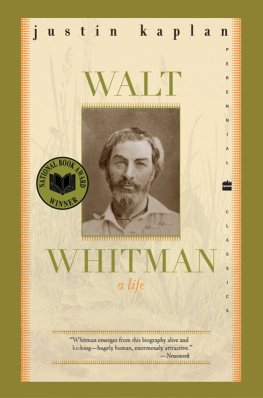
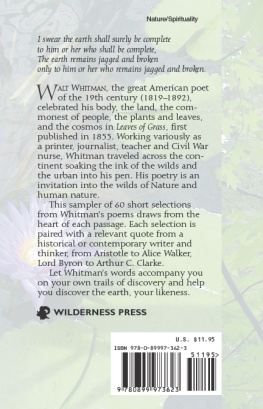
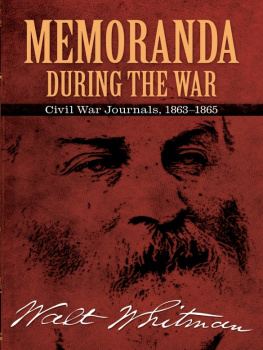

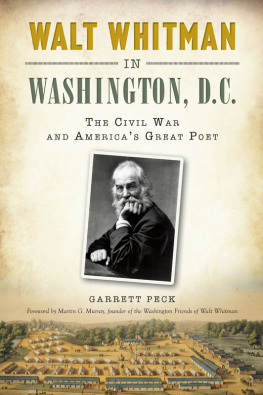
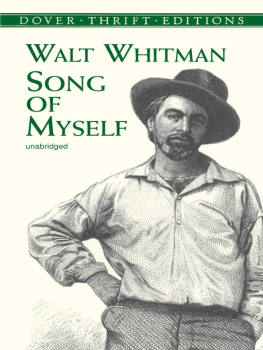
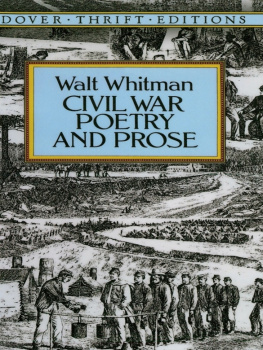

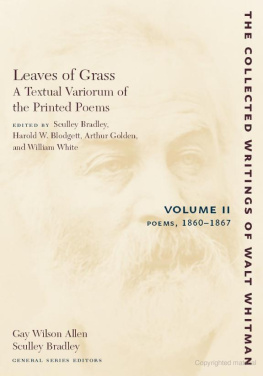

 ON WHITMAN
ON WHITMAN